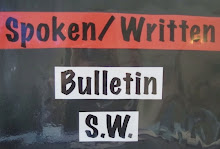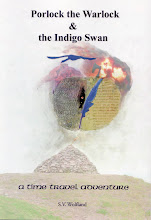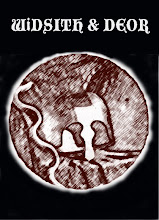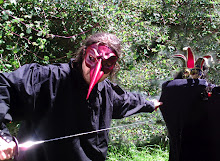Storytelling Written Fiction...
I love storytelling - I love it not least because it frees one from all constraints of how literary work 'should be done'. When I first became aware of it, it seemed to be some strange branch of theatre, but one I didn't understand as while lots of movement and emphasis and voices were in order, the lack of props, costumes, sets and lighting phased me. And of course the extremely stripped down cast... That was then. It's long since I've seen it as an amazing artform - fluid, dynamic, spontaneous - with room for both the polished drama of a speech in the mouth of a hero or powerful narrator, to pocket or full length play all created by one person, sometimes with only one 'voice', and minimal or no props... An artform as old as mankind, that harks back to some of the most vital parts of our 'intangible heritage' - oral history, myth, legend, folklore, folk tales. An art that automatically combines words with performance, and uses movement in gesture, asks, as the scops did in the Dark Ages, for music, and that can be very visual and even use dance. An art that carries its history on its sleeve from The Epic of Gilgamesh to Viking Sagas to Medieval fairytales, and wears its erudition lightly, taking ancient clay tablets and obscure global heritage and fashioning it into something for your ear in the local pub. An art that crosses continents more effortlessly than most, as storytellers from all over the world tell tales from the other side of the world. That somehow, never having been to Sweden or Bulgaria say, I can bring them closer to me, the farmer/peasant culture of turnip tales from the 1600's or Sly Peter the fool figure whose first recorded mentions are also from 1600-1700 by telling those tales. I feel these cultures and past times are suddenly closer at hand, and can be conjured for others to do the same for them too.
The other magical thing about storytelling is its sheer flexibility. And so when I wondered about the relationship which there could be between written literary/post-mass literate society literature and real storytelling, I didn't come to any conclusions but instead just natural occurrences. (No conclusions that is, except that's its bloody hard to write a real fairytale with a true feel of the originals, and that many attempts to construct latterday folktales for oral telling instead of purely literary tributes, had fallen into the numerous pitfalls attendant on such an attempt. And that it was a lot harder than it looked! to retain the simplicity and wisdom of the real thing.)
Instead what happened was this; There were days when the next Storyclub would suddenly come up, and catch me completely unprepared. (For some reason I have never told the same tale twice at the Storyclub unless a second tale is called for - some fetish I suppose.) At which point I would glance round in trepidation, and my co-storyteller would ask me - well what story DO you remember? And it would be something which I had read - either recently, or in one case, years ago - while trawling through e-zines to make sure they were of a good enough quality to be of interest to readers of Spoken/Written Bulletin to be worth their while submitting to.
In every case so far, the stories which I have (in haste) recollected and then retold, have all been from contemporary American fiction. And very splendid examples they have been of them too - hence being so damn memorable that when it came to re-telling them, I could remember the plots and characters, give them all their voices, and fill in any missing details with the storyteller's 'spontaneous adaptation facility' (otherwise known as 'making it up as you go along') - despite sometimes having read them some time ago.
The Stories Themselves...
The first one was a startlingly memorable sci fi/fantasy story called 'Our House' by Paul Di Filippo. It has a repetition structure perfect for storytelling - there is a house with three floors (which all have their features), three couples live there, and each of the two main characters have two encounters apiece - it's also wacky, striking, and the kind of story that's so 'well of course', that you wonder why you hadn't written it yourself. But that of course, is its genius - to capture something that's parallel to what so many understand as being past/present/future, and also the problems and pleasures of shared house living...
The first time I performed it, the audience came to be in hysterics especially on the "Mrs Ab! We've only just met...!" line...it's just a case of getting the timing right on this most generous and perfectly put together of tales. I was thanked very kindly for telling it, and people said they could see why I had remembered it for so long!
Another amazing and completely different story is 'Requiem' by Joshua James Wilson Mattern. It's an incredibly powerful monologue of one man trying to decide what to say - or indeed whether to speak at all - at his estranged father's funeral. At the behest of his beloved sister Sherry, he decides he has to say something...it's a brilliant exploration into that mixture of love, hate, pity, anger and duty that runs through difficult family relationships, and his eventual resolution is, bizarrely both shocking - as is the first line - and 'right'. When I did that one, I felt (probably from drama training) that I became him, and when I stood at the end, I knew the whole audience was with me - it was cathartic, and people were very kind - one person coming up to me and saying 'that was incredibly powerful, and you are an amazing storyteller' afterwards. Just putting on one of my American accents (from drama) and getting lost in the wonderful writing of Joshua Mattern, it was more his triumph than mine, and I e-mailed the magazine afterwards to let them/him know. It was no surprise that they were nominating him for the Pushcart Prize! And were glad I had got in touch.
A story that was totally different again was a retelling or rather a latterday Southern folktale from the Deep South - I was looking at the web resources searching for tales for that month's theme, when I came across a great site called the The Moonlit Road. I flicked through and at once came upon a tale I liked the look of - 'Deal with the Devil'. It read so well and so classically like a folktale, that it was only after I had read it to learn it, that I realized it actually had an author and was a modern 'folktale' by David Hirt. It's very hard to write like a 'real' folktale, and I would class books like Angela Carter's 'The Bloody Chamber' firmly in the literary tradition. To write and capture the old oral mores and tensions in a story is really a lot harder than it looks. (I only have two short stories which I think come anywhere near, and one I'm not so sure about. The other I modify a lot when telling aloud, as well as cut down.) - So I was much impressed by 'Deal with the Devil' which has all the slow richness of a genuine tale from the Deep South - and I had the joy of using another American accent. This one also went down really well with the audience, and I think they thought it must be a 'folktale' without an author till the end, too.
Why do I tell American fiction? - perhaps it's the sheer number of e-zines out there to cater for the many writers of a vast country (but writing in English), or perhaps the strong 'voice' that we in the UK (or at least those of us raised on old films!) can really 'hear', but whatever it is, there's some true gems to be found and told. It's a pleasure to tell them, whether sci fi, monologue or folk story.
To check out these great stories;
Our House by Paul Di Filippo, published online at;
http://www.theedge.abelgratis.co.uk/ourhouse.htm
Requiem by Joshua James Wilson Mattern, published online at;
http://www.sleetmagazine.com/selected/mattern.html
Deal with the Devil by David Hirt published online at;
http://themoonlitroad.com/deal-with-the-devil/
6 years ago





No comments:
Post a Comment